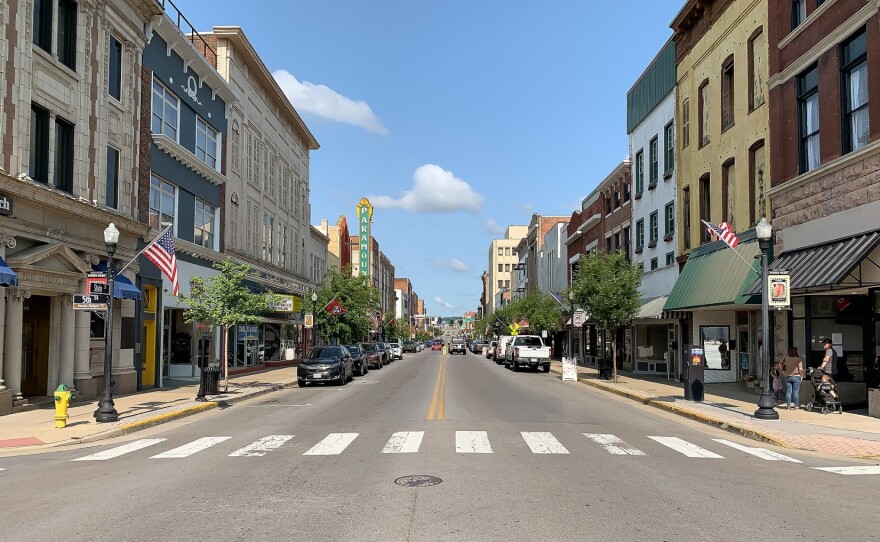Bristol straddles two states: Virginia and Tennessee. In fact, its main thoroughfare is the dividing line between the two. On either side of the street there’s Bristol, Virginia, and Bristol, Tennessee — with two separate sets of governments.
The town’s tourism website boasts that it is the birthplace of country music and that State Street — with shops, restaurants and entertainment venues — represents two states but “one state of mind.”
However, Bristol is center stage in Virginia’s latest fight over abortion access. After Roe v. Wade was overturned in June, what’s known as a “trigger law” took effect in Tennessee, creating a near-total ban on abortions in the state. Before the law took effect, a Tennessee-based abortion clinic in Bristol moved across state lines to continue operating.
That move prompted the city council in Bristol, Virginia, to introduce a resolution designed to restrict expansion of abortion access in the city through zoning changes. The resolution passed unanimously, but Victoria Cobb, executive director of the Family Foundation of Virginia, said there are still a “number of steps” it needs to go through — like going to the planning commission, which sets the zoning criteria — before taking effect.
Cobb supports the resolution, saying it will “protect their community from exploitation by the abortion industry, [which] has targeted it for tourism, destination abortion.” But she said the resolution will do nothing to prevent the current clinic from continuing to operate as is.
“The concept is that in the future, no additional abortion providers could move in because they would be violating the zoning ordinances,” Cobb said. “And it would ultimately affect the existing clinic if they chose to expand or create satellites or in any way alter their existing facility.”
Two other Southwest Virginia localities — Russell and Tazewell counties — passed similar resolutions in September, and Cobb said she’s heard other localities in other parts of the state are considering taking similar steps.
“The landscape has changed after the [Dobbs v. Jackson] decision. And so, localities are feeling strengthened that they can in fact choose for themselves to protect human life,” Cobb said. “This wouldn't have been the case in Virginia prior to Roe being struck down.”
Zoning changes to restrict abortion access not a new trend
Jamie Lockhart, executive director of Planned Parenthood Advocates of Virginia, said Bristol’s ordinance is “just another way for politicians and anti-abortion rights activists to shame and stigmatize people who get abortions, all while putting up additional obstacles to care.”
She said the tool Bristol’s city council is using to restrict abortion access isn’t new, pointing to a wave of restrictions imposed on abortion clinics starting in 2011 when the state legislature voted to put in place so-called “TRAP” regulations — targeted restrictions for abortion providers.
“They created these building requirements: things like the widths of hallways and how many parking spots they needed to have,” Lockhart said. “Restrictions that weren’t based in health or science in any way. They had nothing to do with providing abortion. They were really a tactic by those that are against abortion to try to create obstacles for people accessing care, and to shut down and to increase the cost of those that are providing care.”
The number of abortions in Virginia declined sharply between 2013 and 2014, which Lockhart attributed to the TRAP regulations taking effect. Around that same time, some Virginia localities took matters into their own hands to restrict abortion access as well.
In 2013, the Fairfax City Council voted to change its zoning law to reclassify abortion clinics as “medical care facilities,” requiring them to obtain a special-use permit and go through a detailed approval process — with final approval by the City Council — before operating. Subsequently, the largest abortion provider in the state closed.
In 2015, the Manassas City Council proposed similar changes to its zoning laws, which were ultimately approved.
As for the legality of Bristol’s resolution — as well as those in other localities seeking to restrict abortion access — Lockhart said, “It is a complicated question that lawyers are looking into.”
Cobb anticipated legal challenges.
“Rarely does a state or a locality move forward protecting human life that the abortion industry does not send their efforts into litigation,” Cobb said.
In a statement, the ACLU of Virginia said Bristol’s resolution “raises significant legal concerns and may potentially infringe on individuals’ civil liberties and civil rights.”



